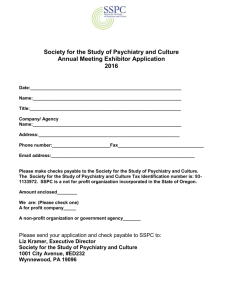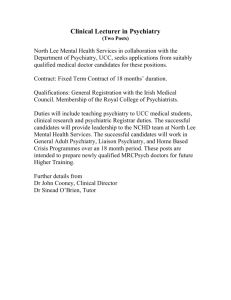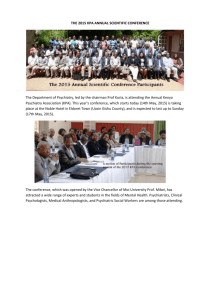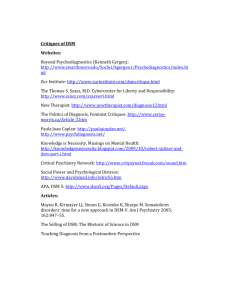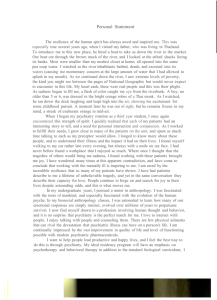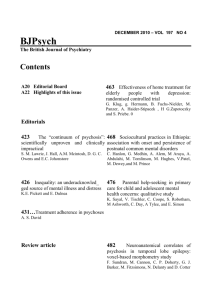Psychiatry Books Student Recommendations: It is tempting to take
advertisement
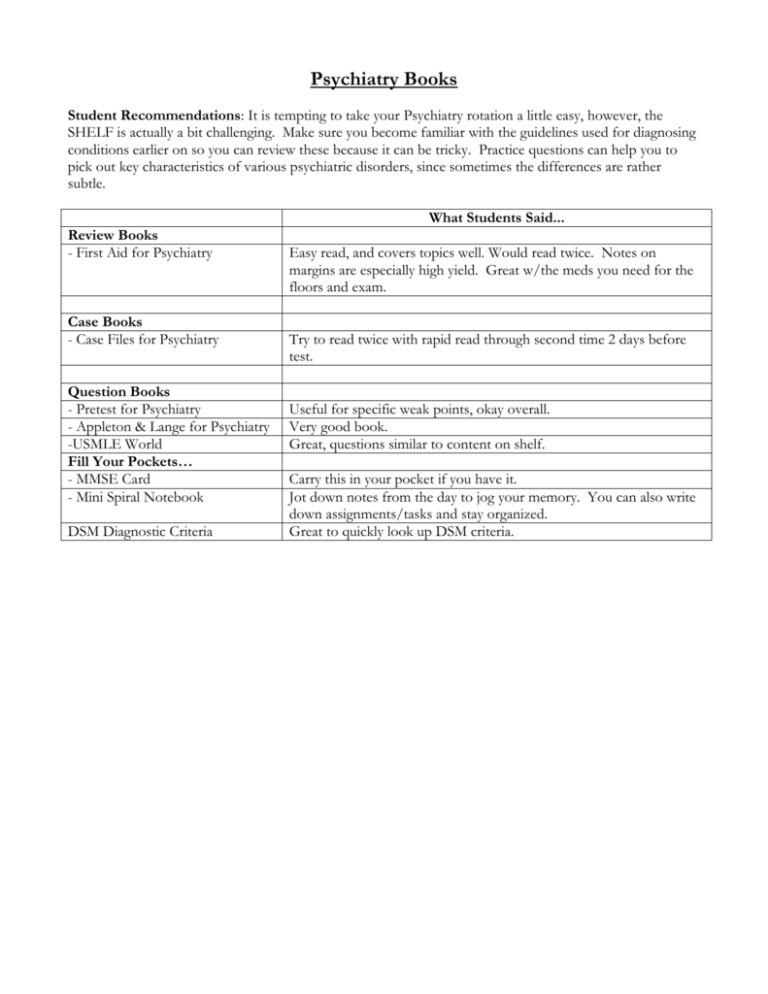
Psychiatry Books Student Recommendations: It is tempting to take your Psychiatry rotation a little easy, however, the SHELF is actually a bit challenging. Make sure you become familiar with the guidelines used for diagnosing conditions earlier on so you can review these because it can be tricky. Practice questions can help you to pick out key characteristics of various psychiatric disorders, since sometimes the differences are rather subtle. What Students Said... Review Books - First Aid for Psychiatry Case Books - Case Files for Psychiatry Question Books - Pretest for Psychiatry - Appleton & Lange for Psychiatry -USMLE World Fill Your Pockets… - MMSE Card - Mini Spiral Notebook DSM Diagnostic Criteria Easy read, and covers topics well. Would read twice. Notes on margins are especially high yield. Great w/the meds you need for the floors and exam. Try to read twice with rapid read through second time 2 days before test. Useful for specific weak points, okay overall. Very good book. Great, questions similar to content on shelf. Carry this in your pocket if you have it. Jot down notes from the day to jog your memory. You can also write down assignments/tasks and stay organized. Great to quickly look up DSM criteria. What to Read the Weekend Before/First Few Days Dr. Morreale gives you a great overview on how to do a complete psych history during orientation. It is definitely useful to review your antipsychotics, as that is often a component of management. Dementia vs delirium, major depression, bipolar disorder (and its various subtypes), somatoform disorders and suicidality are the most high yield topics in terms of the floors. Knowing what capacity vs competence is useful (often assess capacity during consults). What to Do on the Floors When interviewing a patient, remember to sit between the patient and the door. If you feel unsafe, it is okay, just let someone know! Preparing for the Psychiatry OSCE & SHELF OSCE: Make sure you make the patient feel at ease – the patient may be defensive and unpleasant. You may not necessarily have to play the role of a psychiatrist. You may have to play the role of a general practitioner who has to be able to identify the psychiatric condition in order to refer the patient to a psychiatrist. SHELF: The SHELF is harder than you might expect. Being able to pick out subtle differences between conditions is key to properly diagnosing a condition. Also, pay attention to the timelines of diseases (how long symptoms have to be present to classify a particular disease). And you must know your antipsychotics. This is what makes the exam tricky. Make sure you go to the review session at the end, this was extremely high yield! Psychiatry Site-Specific Advice Site DRH/Crisis Center VA HFHS What Students Said… Dr. Ajluni is great to work with. He is very approachable. Interview patients whenever you get the chance and have fun on your rotation. Also, if you need a letter of rec., Dr. Ajluni is willing to write one for you. It may be a little bit more difficult to get the opportunity to present cases, so if you get the opportunity, take it. Time is split with 2 weeks of inpatient at Kingswood and 2 weeks of consults. Most people really enjoy Kingswood, and you see great pathology. Hours usually 8-5PM while there. Consults can be variable in terms of how busy you will be, make sure you always have something to read. You have a total of two short calls (until 10PM), and no weekends. Lectures are really useful for the shelf exam. Useful Note Templates 1) There are templates available on medfools.com (under download section) to help keep track of patients you are following. 2) Maxwell’s (Yellow Section): Admit/transfer, progress, and discharge notes . Blue section also has a template for complete history and physical.
